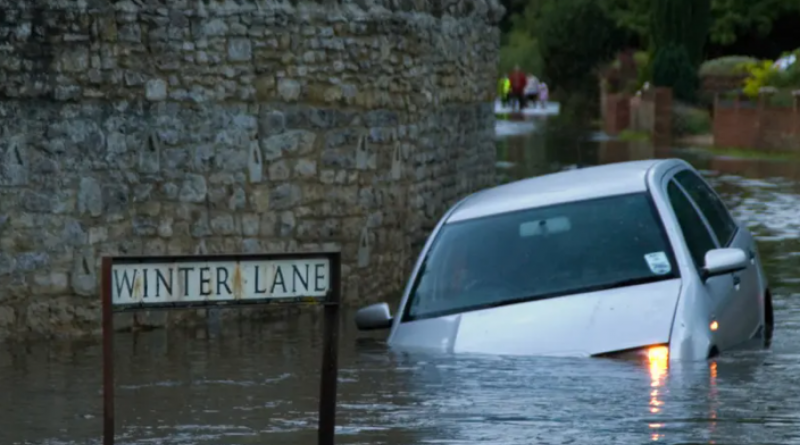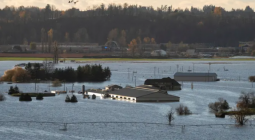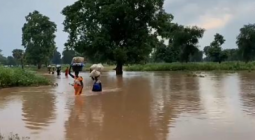Government warns climate crisis is increasing risk of flooding ahead of extra wet winter

Environment Agency urges those in flood risk areas to take preventative measures to stave off worst flood impacts
The government has warned that the climate crisis is exacerbating flood risks across the country, and is urging people to prepare for possible flooding ahead of what may be a particularly wet winter.
The Met Office has warned there is an “above average” likelihood of the coming winter being wetter than normal over December, January and February.
The Environment Agency said a new analysis of attitudes to flood risk revealed two-thirds of people in flood-risk areas don’t believe it will happen to them.
The agency said their research also suggests 30 per cent of people in these areas have not taken any action to prepare for flooding, leaving as many as 1.5 million households at risk of heavy impacts should their homes be inundated.
The government released the analysis to mark the start of Flood Action Week on Monday. The Environment Agency is urging people to check their flood risk online, sign up for flood warnings and, if they are at risk, to know what to do if flooding hits.
The government said the construction and repair of flood defences has continued throughout the year as part of a £5.2bn programme which aims to better protect 336,000 properties.
But they warned that the works could not prevent against all flooding.
Caroline Douglass, executive director of flooding at the Environment Agency, said: “Now is the time for us all to be vigilant, not complacent, about flooding.
“Our previous investment programme protected 314,000 properties from flooding. Our flood defences have helped to protect nearly 200,000 properties during flooding incidents since 2019, and we’re investing millions into building new schemes and making repairs to keep communities safe.
“Yet we can’t prevent all flooding – climate change is only increasing that risk – and today’s figures show that while some people are prepared, many are not.”
The agency said those at risk are encouraged to follow the advice to “Prepare. Act. Survive.”
“If there is a flood alert – prepare by packing medicines and insurance and other important documents and visit the flood warning information service,” the Environment Agency said in a statement.
“If there is a flood warning, act by moving family, pets and belongings to safety. Turn off gas, water and electricity. If there is a severe flood warning – survive immediate danger by following the advice of emergency services or calling 999 if needed.”
The warning comes hours after insurers raised concerns about the government rubber-stamping the building of thousands of new homes in areas prone to flooding.
More than 5,000 new properties in areas at higher risk in England have been approved to be built this year, according to a report commissioned by LV= General Insurance.
It found that 200 planning permissions had been granted for 5,283 new homes in local authority areas where more than 10 per cent of homes are already at significant risk of flooding.
Speaking about the potential for wet weather ahead, Will Lang, head of civil contingencies at the Met Office, said: “Winters in the UK usually include a wide variety of weather and this winter looks to be no exception. However, when looking at the big global drivers that impact weather in the UK there are indications this winter could be wetter than normal.
“Although these wetter conditions are most likely in January and February next year, details will become clearer nearer the time and information can be found on the forecast pages of our website.”
Experts also said caution should be exercised on roads during any floods, with just 30cm of flowing water being enough to float a car.
Tony Rich, from the AA, said: “Roads can quickly become impassable during very heavy rainfall, so you should allow plenty of time for journeys. It’s also important to leave twice as much space between you and the car in front to allow for greater stopping distances.
“Drivers should take extra care where roads dip, for example under bridges, as these areas are more likely to flood.
“Flood water can be deceptively deep, and it doesn’t take much for water to get sucked into your engine. It can also mask other hazards in the road, such as displaced manhole covers, so if in doubt turn around and find another route.”
23 November 2021
The Independent




